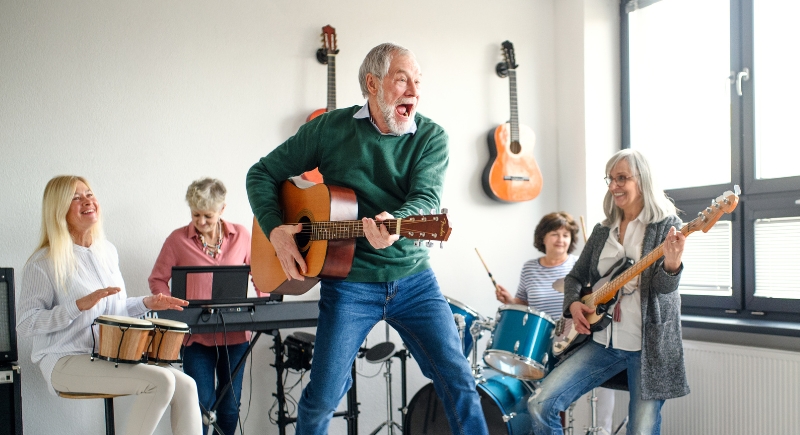This Simple Hobby Might Be the Brain’s Strongest Ally Against Aging
Some signs of aging are easy to ignore. In particular, when your memory dulls or conversations get harder to follow, it can affect daily life frustratingly. The good news is that one hobby—musical training—has shown consistent benefits for keeping the brain sharper for an extended period of time.
In fact, researchers and neurologists now say learning and practicing music could be one of the most effective long-term habits for preserving cognitive performance, even late into adulthood.
Long-Term Musicians Show Youth-Like Brain Activity

Image via Canva/Africa Images
In a study by researchers in the Auditory Neuroscience Laboratory at Northwestern University, older adults who had spent decades playing an instrument demonstrated mental function that closely resembled that of younger people.
Experts tested 74 participants’ ability to recognize simple speech sounds under noisy conditions. Those with over 30 years of musical experience responded more efficiently and with less brain strain. Consequently, functional scans showed that their minds didn’t need to activate additional regions to complete the task.
Meanwhile, non-musicians often compensated by recruiting more neural areas, which suggested less efficient processing. The musicians performed best when they relied on their natural, default responses. For them, trying harder actually led to worse outcomes, which indicated that their baseline cognitive pathways remained strong without extra effort.
This kind of streamlined function is rare in older brains, which typically begin compensating for loss by working harder. Music practice helps the brain avoid that detour by keeping core systems in a stable working condition.
Cognitive Reserve Builds Through Repetition and Challenge
Musicians develop what professionals refer to as “cognitive reserve,” a form of mental resilience that protects against aging. This reserve forms when the brain strengthens and maintains its internal wiring through challenging, repeated activity. Playing an instrument requires a mix of auditory processing, memory recall, motor coordination, and timing. These systems are used every time a musician practices.
Over the years, this layered engagement reinforces existing networks and builds new connections, particularly in regions that tend to decline with age.
Regular activity also lets the mind stay flexible, manage complex tasks, and retain new information. These protective effects are not theoretical since researchers have observed them in scans and behavioral assessments. The data supports the idea that musicians maintain sharper attention and memory due to the unique mental workout that musical training provides.
Strengthens Language and Listening Skills

Image via Canva/Halfpoint
Speech processing becomes more difficult with age, especially in noisy environments. However, people with long-term musical experience often manage better in those situations. Music and language rely on shared neural pathways, particularly those used for rhythm and auditory processing. Playing music helps the brain learn to recognize patterns in sound—like shifts in pitch and changes in timing—which are the same skills we rely on to understand speech. As a result, musicians tend to perform comparatively well on tasks that involve speech recognition, especially under challenging listening conditions.
Emotional Health Also Improves
Beyond its mental benefits, playing music also supports emotional well-being. Consistent use of an instrument has been shown to release dopamine and endorphins, both associated with motivation and pleasure. At the same time, it reduces levels of cortisol, the hormone linked to stress. This combination leads to lower anxiety and improved mood.
Older adults who engage in musical activities also benefit from stronger social bonds. Group lessons, performances, or even casual music-making can increase connection and reduce loneliness.
Together, these effects contribute to a better quality of life. Music nurtures the brain’s emotional centers as much as its cognitive ones to create a feedback loop where improved mood reinforces consistent engagement.